MBA Dissertation: Project Manager's Competencies and Project Success
VerifiedAdded on 2020/07/22
|16
|6311
|28
Literature Review
AI Summary
This MBA dissertation chapter provides a comprehensive literature review on project management, with a specific focus on the competencies of project managers and their impact on project success, particularly within the mining industry. The review begins by defining project management and its various phases, highlighting the importance of skills, knowledge, and tools in achieving project objectives. It then delves into the concept of project success, exploring how it is measured and the factors that contribute to it, including the traditional iron triangle of cost, quality, and time, as well as newer considerations like capital asset and client satisfaction. The review examines project manager competencies, categorizing them into knowledge, skills, and abilities, and discusses how these competencies influence project outcomes. Furthermore, the review analyzes relevant articles and research, particularly focusing on the context of mining companies in the Western Region of Ghana, and explores the challenges and opportunities faced by project managers in this specific setting. The paper also discusses the importance of project management in the mining sector and the need for skilled professionals to handle complex projects. The review also highlights the significance of environmental considerations and the role of project managers in addressing potential risks. Finally, the review emphasizes the evolving demands of project management in the mining industry and the need for companies to adopt effective project management tools and strategies.

MBA Dissertation
Paraphrase This Document
Need a fresh take? Get an instant paraphrase of this document with our AI Paraphraser
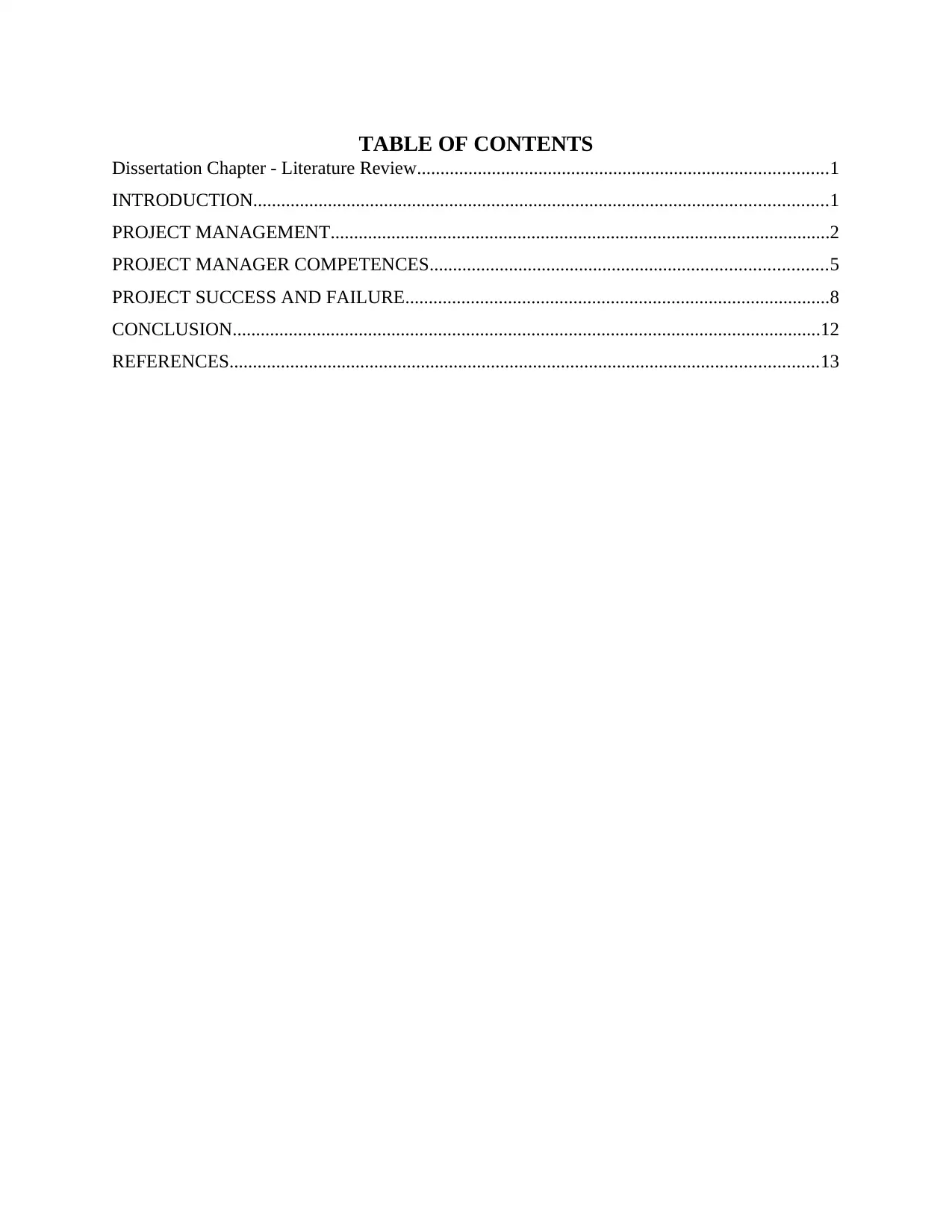
TABLE OF CONTENTS
Dissertation Chapter - Literature Review........................................................................................1
INTRODUCTION...........................................................................................................................1
PROJECT MANAGEMENT...........................................................................................................2
PROJECT MANAGER COMPETENCES.....................................................................................5
PROJECT SUCCESS AND FAILURE...........................................................................................8
CONCLUSION..............................................................................................................................12
REFERENCES..............................................................................................................................13
Dissertation Chapter - Literature Review........................................................................................1
INTRODUCTION...........................................................................................................................1
PROJECT MANAGEMENT...........................................................................................................2
PROJECT MANAGER COMPETENCES.....................................................................................5
PROJECT SUCCESS AND FAILURE...........................................................................................8
CONCLUSION..............................................................................................................................12
REFERENCES..............................................................................................................................13
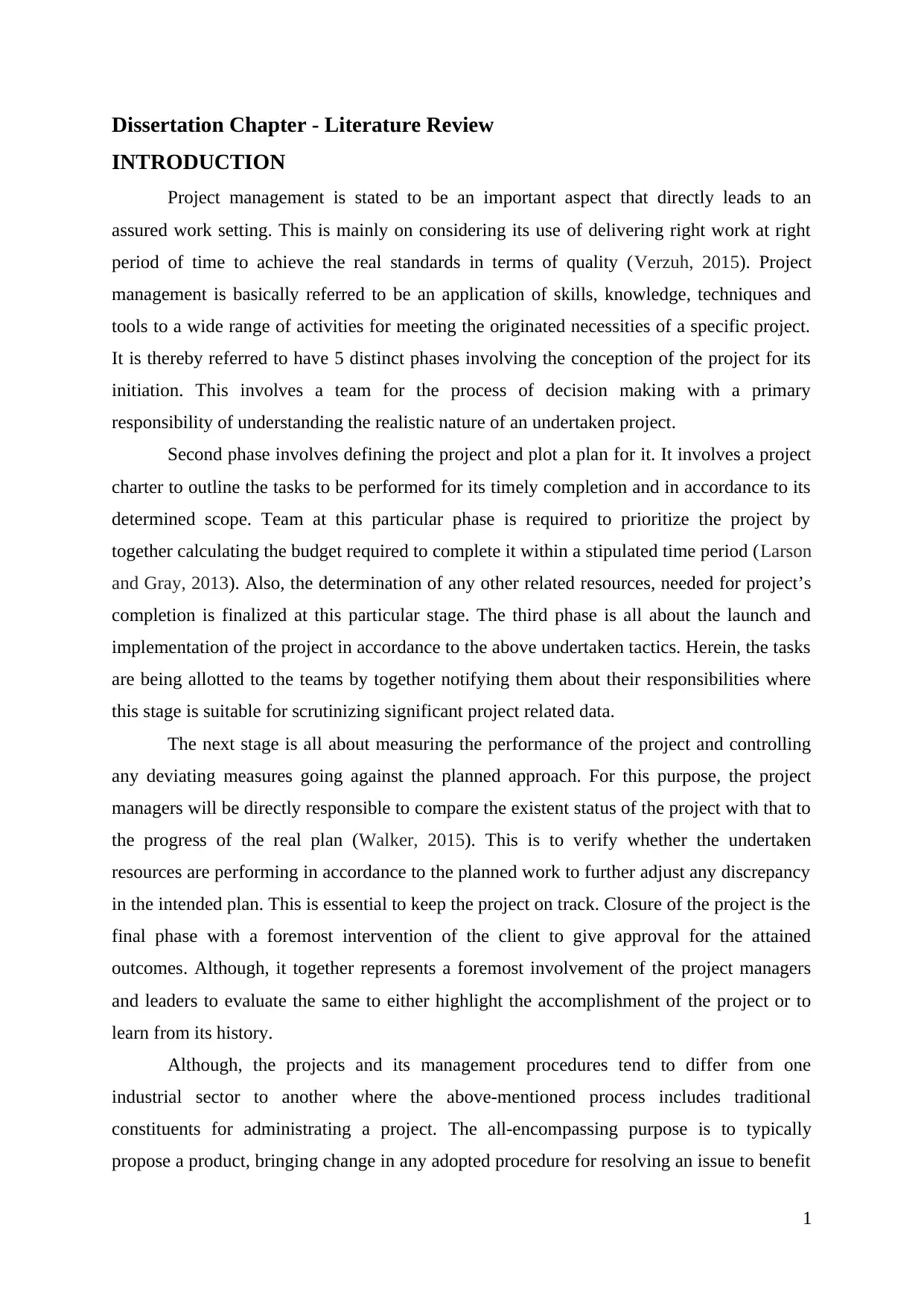
Dissertation Chapter - Literature Review
INTRODUCTION
Project management is stated to be an important aspect that directly leads to an
assured work setting. This is mainly on considering its use of delivering right work at right
period of time to achieve the real standards in terms of quality (Verzuh, 2015). Project
management is basically referred to be an application of skills, knowledge, techniques and
tools to a wide range of activities for meeting the originated necessities of a specific project.
It is thereby referred to have 5 distinct phases involving the conception of the project for its
initiation. This involves a team for the process of decision making with a primary
responsibility of understanding the realistic nature of an undertaken project.
Second phase involves defining the project and plot a plan for it. It involves a project
charter to outline the tasks to be performed for its timely completion and in accordance to its
determined scope. Team at this particular phase is required to prioritize the project by
together calculating the budget required to complete it within a stipulated time period (Larson
and Gray, 2013). Also, the determination of any other related resources, needed for project’s
completion is finalized at this particular stage. The third phase is all about the launch and
implementation of the project in accordance to the above undertaken tactics. Herein, the tasks
are being allotted to the teams by together notifying them about their responsibilities where
this stage is suitable for scrutinizing significant project related data.
The next stage is all about measuring the performance of the project and controlling
any deviating measures going against the planned approach. For this purpose, the project
managers will be directly responsible to compare the existent status of the project with that to
the progress of the real plan (Walker, 2015). This is to verify whether the undertaken
resources are performing in accordance to the planned work to further adjust any discrepancy
in the intended plan. This is essential to keep the project on track. Closure of the project is the
final phase with a foremost intervention of the client to give approval for the attained
outcomes. Although, it together represents a foremost involvement of the project managers
and leaders to evaluate the same to either highlight the accomplishment of the project or to
learn from its history.
Although, the projects and its management procedures tend to differ from one
industrial sector to another where the above-mentioned process includes traditional
constituents for administrating a project. The all-encompassing purpose is to typically
propose a product, bringing change in any adopted procedure for resolving an issue to benefit
1
INTRODUCTION
Project management is stated to be an important aspect that directly leads to an
assured work setting. This is mainly on considering its use of delivering right work at right
period of time to achieve the real standards in terms of quality (Verzuh, 2015). Project
management is basically referred to be an application of skills, knowledge, techniques and
tools to a wide range of activities for meeting the originated necessities of a specific project.
It is thereby referred to have 5 distinct phases involving the conception of the project for its
initiation. This involves a team for the process of decision making with a primary
responsibility of understanding the realistic nature of an undertaken project.
Second phase involves defining the project and plot a plan for it. It involves a project
charter to outline the tasks to be performed for its timely completion and in accordance to its
determined scope. Team at this particular phase is required to prioritize the project by
together calculating the budget required to complete it within a stipulated time period (Larson
and Gray, 2013). Also, the determination of any other related resources, needed for project’s
completion is finalized at this particular stage. The third phase is all about the launch and
implementation of the project in accordance to the above undertaken tactics. Herein, the tasks
are being allotted to the teams by together notifying them about their responsibilities where
this stage is suitable for scrutinizing significant project related data.
The next stage is all about measuring the performance of the project and controlling
any deviating measures going against the planned approach. For this purpose, the project
managers will be directly responsible to compare the existent status of the project with that to
the progress of the real plan (Walker, 2015). This is to verify whether the undertaken
resources are performing in accordance to the planned work to further adjust any discrepancy
in the intended plan. This is essential to keep the project on track. Closure of the project is the
final phase with a foremost intervention of the client to give approval for the attained
outcomes. Although, it together represents a foremost involvement of the project managers
and leaders to evaluate the same to either highlight the accomplishment of the project or to
learn from its history.
Although, the projects and its management procedures tend to differ from one
industrial sector to another where the above-mentioned process includes traditional
constituents for administrating a project. The all-encompassing purpose is to typically
propose a product, bringing change in any adopted procedure for resolving an issue to benefit
1
⊘ This is a preview!⊘
Do you want full access?
Subscribe today to unlock all pages.

Trusted by 1+ million students worldwide
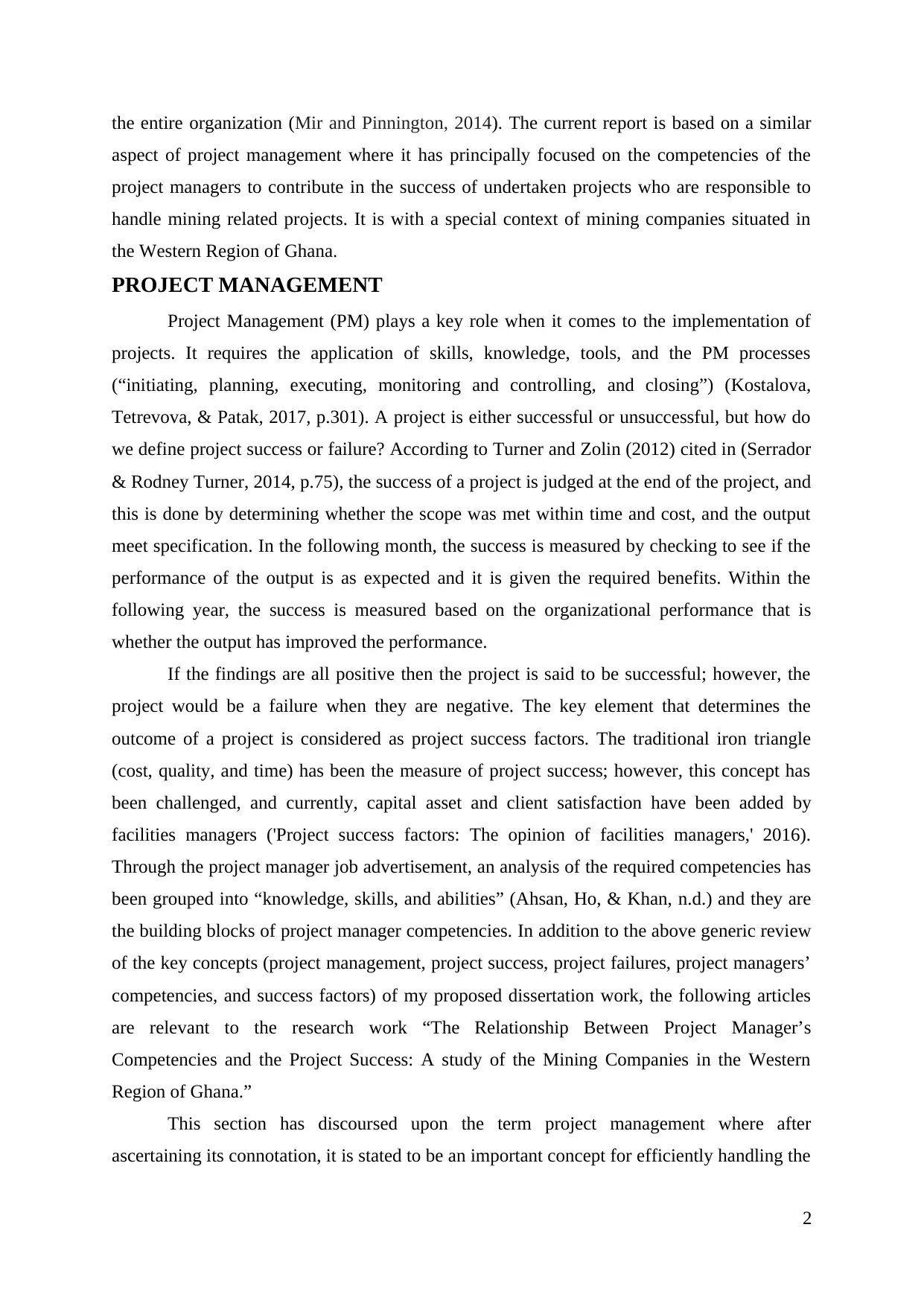
the entire organization (Mir and Pinnington, 2014). The current report is based on a similar
aspect of project management where it has principally focused on the competencies of the
project managers to contribute in the success of undertaken projects who are responsible to
handle mining related projects. It is with a special context of mining companies situated in
the Western Region of Ghana.
PROJECT MANAGEMENT
Project Management (PM) plays a key role when it comes to the implementation of
projects. It requires the application of skills, knowledge, tools, and the PM processes
(“initiating, planning, executing, monitoring and controlling, and closing”) (Kostalova,
Tetrevova, & Patak, 2017, p.301). A project is either successful or unsuccessful, but how do
we define project success or failure? According to Turner and Zolin (2012) cited in (Serrador
& Rodney Turner, 2014, p.75), the success of a project is judged at the end of the project, and
this is done by determining whether the scope was met within time and cost, and the output
meet specification. In the following month, the success is measured by checking to see if the
performance of the output is as expected and it is given the required benefits. Within the
following year, the success is measured based on the organizational performance that is
whether the output has improved the performance.
If the findings are all positive then the project is said to be successful; however, the
project would be a failure when they are negative. The key element that determines the
outcome of a project is considered as project success factors. The traditional iron triangle
(cost, quality, and time) has been the measure of project success; however, this concept has
been challenged, and currently, capital asset and client satisfaction have been added by
facilities managers ('Project success factors: The opinion of facilities managers,' 2016).
Through the project manager job advertisement, an analysis of the required competencies has
been grouped into “knowledge, skills, and abilities” (Ahsan, Ho, & Khan, n.d.) and they are
the building blocks of project manager competencies. In addition to the above generic review
of the key concepts (project management, project success, project failures, project managers’
competencies, and success factors) of my proposed dissertation work, the following articles
are relevant to the research work “The Relationship Between Project Manager’s
Competencies and the Project Success: A study of the Mining Companies in the Western
Region of Ghana.”
This section has discoursed upon the term project management where after
ascertaining its connotation, it is stated to be an important concept for efficiently handling the
2
aspect of project management where it has principally focused on the competencies of the
project managers to contribute in the success of undertaken projects who are responsible to
handle mining related projects. It is with a special context of mining companies situated in
the Western Region of Ghana.
PROJECT MANAGEMENT
Project Management (PM) plays a key role when it comes to the implementation of
projects. It requires the application of skills, knowledge, tools, and the PM processes
(“initiating, planning, executing, monitoring and controlling, and closing”) (Kostalova,
Tetrevova, & Patak, 2017, p.301). A project is either successful or unsuccessful, but how do
we define project success or failure? According to Turner and Zolin (2012) cited in (Serrador
& Rodney Turner, 2014, p.75), the success of a project is judged at the end of the project, and
this is done by determining whether the scope was met within time and cost, and the output
meet specification. In the following month, the success is measured by checking to see if the
performance of the output is as expected and it is given the required benefits. Within the
following year, the success is measured based on the organizational performance that is
whether the output has improved the performance.
If the findings are all positive then the project is said to be successful; however, the
project would be a failure when they are negative. The key element that determines the
outcome of a project is considered as project success factors. The traditional iron triangle
(cost, quality, and time) has been the measure of project success; however, this concept has
been challenged, and currently, capital asset and client satisfaction have been added by
facilities managers ('Project success factors: The opinion of facilities managers,' 2016).
Through the project manager job advertisement, an analysis of the required competencies has
been grouped into “knowledge, skills, and abilities” (Ahsan, Ho, & Khan, n.d.) and they are
the building blocks of project manager competencies. In addition to the above generic review
of the key concepts (project management, project success, project failures, project managers’
competencies, and success factors) of my proposed dissertation work, the following articles
are relevant to the research work “The Relationship Between Project Manager’s
Competencies and the Project Success: A study of the Mining Companies in the Western
Region of Ghana.”
This section has discoursed upon the term project management where after
ascertaining its connotation, it is stated to be an important concept for efficiently handling the
2
Paraphrase This Document
Need a fresh take? Get an instant paraphrase of this document with our AI Paraphraser
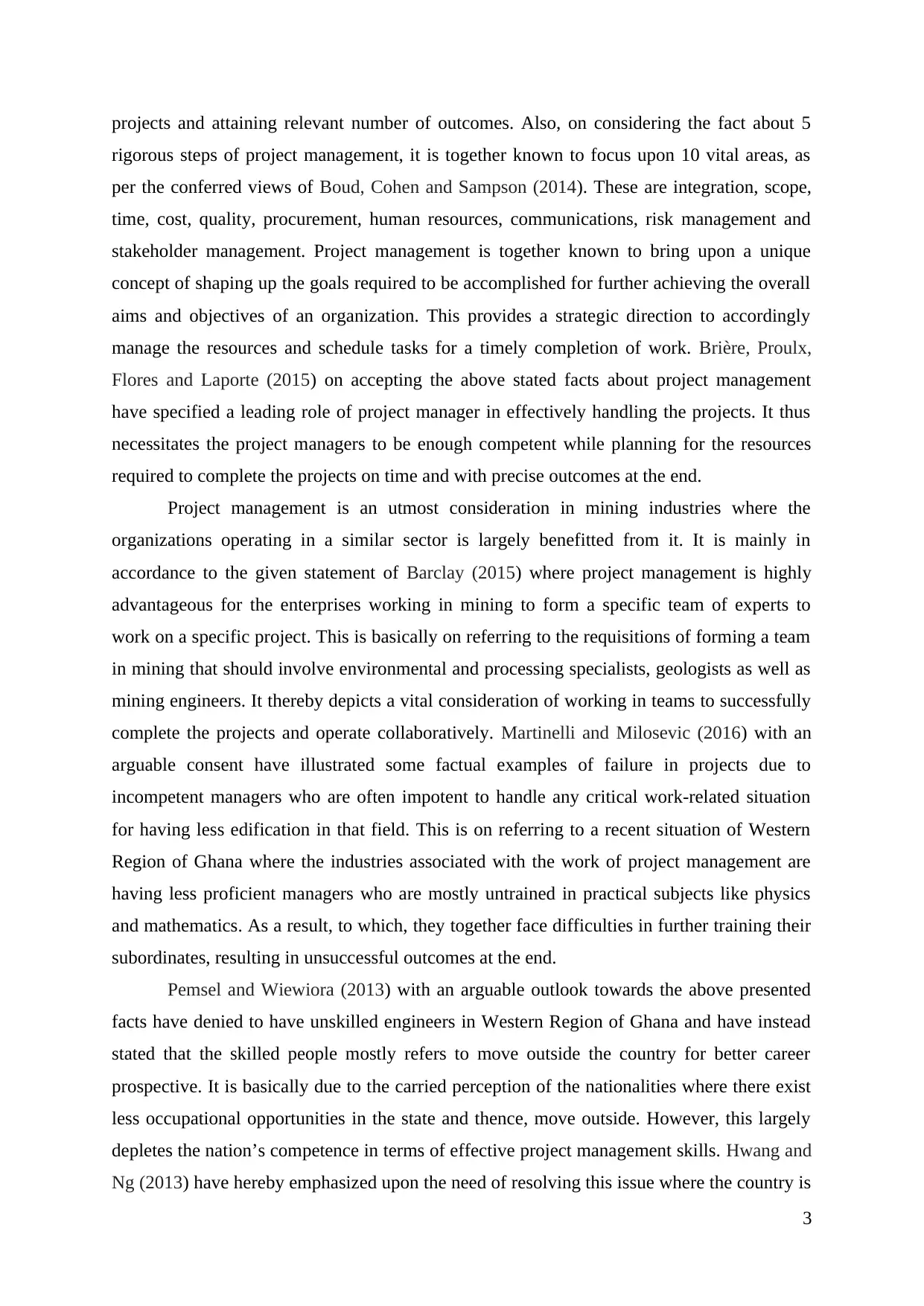
projects and attaining relevant number of outcomes. Also, on considering the fact about 5
rigorous steps of project management, it is together known to focus upon 10 vital areas, as
per the conferred views of Boud, Cohen and Sampson (2014). These are integration, scope,
time, cost, quality, procurement, human resources, communications, risk management and
stakeholder management. Project management is together known to bring upon a unique
concept of shaping up the goals required to be accomplished for further achieving the overall
aims and objectives of an organization. This provides a strategic direction to accordingly
manage the resources and schedule tasks for a timely completion of work. Brière, Proulx,
Flores and Laporte (2015) on accepting the above stated facts about project management
have specified a leading role of project manager in effectively handling the projects. It thus
necessitates the project managers to be enough competent while planning for the resources
required to complete the projects on time and with precise outcomes at the end.
Project management is an utmost consideration in mining industries where the
organizations operating in a similar sector is largely benefitted from it. It is mainly in
accordance to the given statement of Barclay (2015) where project management is highly
advantageous for the enterprises working in mining to form a specific team of experts to
work on a specific project. This is basically on referring to the requisitions of forming a team
in mining that should involve environmental and processing specialists, geologists as well as
mining engineers. It thereby depicts a vital consideration of working in teams to successfully
complete the projects and operate collaboratively. Martinelli and Milosevic (2016) with an
arguable consent have illustrated some factual examples of failure in projects due to
incompetent managers who are often impotent to handle any critical work-related situation
for having less edification in that field. This is on referring to a recent situation of Western
Region of Ghana where the industries associated with the work of project management are
having less proficient managers who are mostly untrained in practical subjects like physics
and mathematics. As a result, to which, they together face difficulties in further training their
subordinates, resulting in unsuccessful outcomes at the end.
Pemsel and Wiewiora (2013) with an arguable outlook towards the above presented
facts have denied to have unskilled engineers in Western Region of Ghana and have instead
stated that the skilled people mostly refers to move outside the country for better career
prospective. It is basically due to the carried perception of the nationalities where there exist
less occupational opportunities in the state and thence, move outside. However, this largely
depletes the nation’s competence in terms of effective project management skills. Hwang and
Ng (2013) have hereby emphasized upon the need of resolving this issue where the country is
3
rigorous steps of project management, it is together known to focus upon 10 vital areas, as
per the conferred views of Boud, Cohen and Sampson (2014). These are integration, scope,
time, cost, quality, procurement, human resources, communications, risk management and
stakeholder management. Project management is together known to bring upon a unique
concept of shaping up the goals required to be accomplished for further achieving the overall
aims and objectives of an organization. This provides a strategic direction to accordingly
manage the resources and schedule tasks for a timely completion of work. Brière, Proulx,
Flores and Laporte (2015) on accepting the above stated facts about project management
have specified a leading role of project manager in effectively handling the projects. It thus
necessitates the project managers to be enough competent while planning for the resources
required to complete the projects on time and with precise outcomes at the end.
Project management is an utmost consideration in mining industries where the
organizations operating in a similar sector is largely benefitted from it. It is mainly in
accordance to the given statement of Barclay (2015) where project management is highly
advantageous for the enterprises working in mining to form a specific team of experts to
work on a specific project. This is basically on referring to the requisitions of forming a team
in mining that should involve environmental and processing specialists, geologists as well as
mining engineers. It thereby depicts a vital consideration of working in teams to successfully
complete the projects and operate collaboratively. Martinelli and Milosevic (2016) with an
arguable consent have illustrated some factual examples of failure in projects due to
incompetent managers who are often impotent to handle any critical work-related situation
for having less edification in that field. This is on referring to a recent situation of Western
Region of Ghana where the industries associated with the work of project management are
having less proficient managers who are mostly untrained in practical subjects like physics
and mathematics. As a result, to which, they together face difficulties in further training their
subordinates, resulting in unsuccessful outcomes at the end.
Pemsel and Wiewiora (2013) with an arguable outlook towards the above presented
facts have denied to have unskilled engineers in Western Region of Ghana and have instead
stated that the skilled people mostly refers to move outside the country for better career
prospective. It is basically due to the carried perception of the nationalities where there exist
less occupational opportunities in the state and thence, move outside. However, this largely
depletes the nation’s competence in terms of effective project management skills. Hwang and
Ng (2013) have hereby emphasized upon the need of resolving this issue where the country is
3
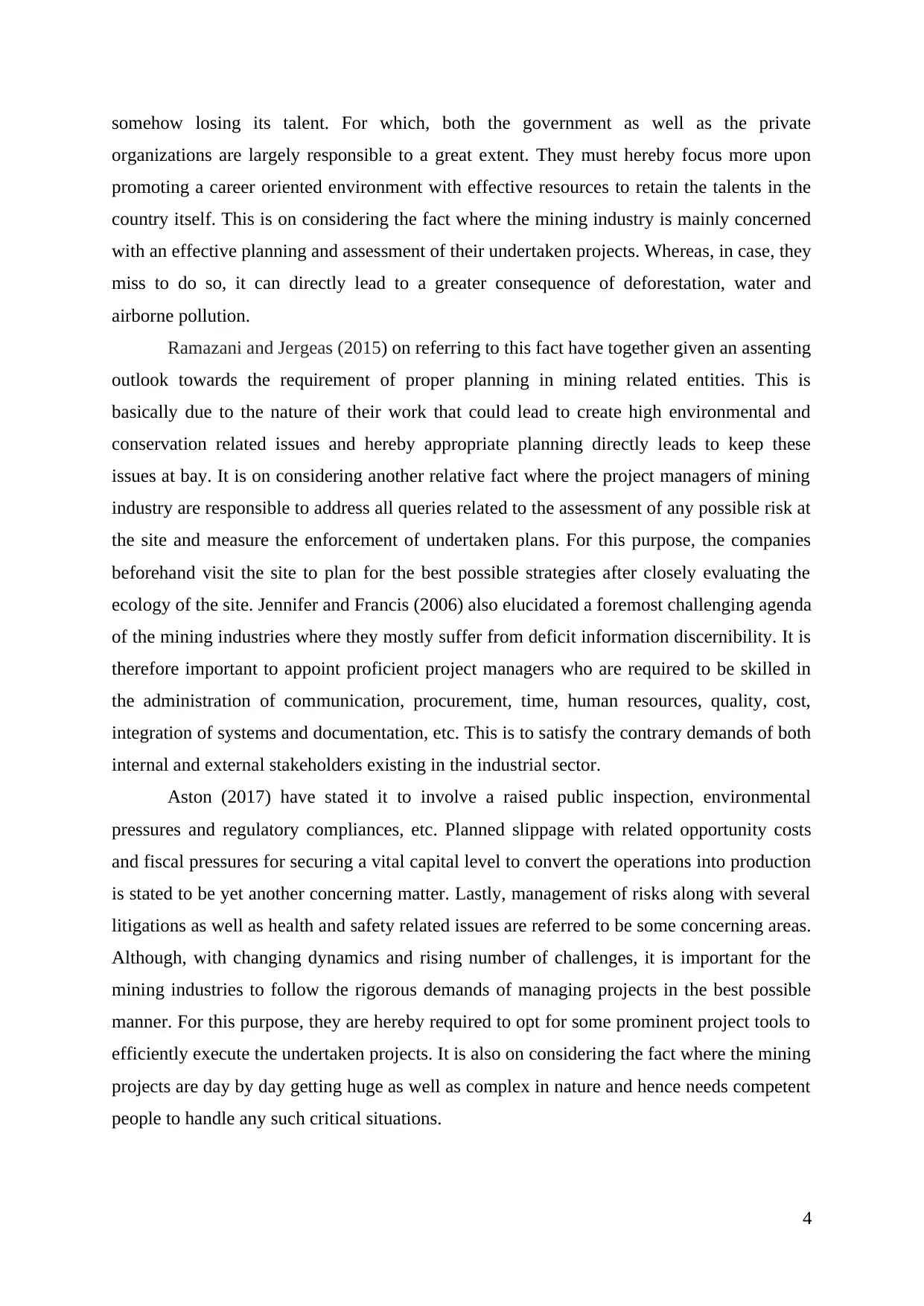
somehow losing its talent. For which, both the government as well as the private
organizations are largely responsible to a great extent. They must hereby focus more upon
promoting a career oriented environment with effective resources to retain the talents in the
country itself. This is on considering the fact where the mining industry is mainly concerned
with an effective planning and assessment of their undertaken projects. Whereas, in case, they
miss to do so, it can directly lead to a greater consequence of deforestation, water and
airborne pollution.
Ramazani and Jergeas (2015) on referring to this fact have together given an assenting
outlook towards the requirement of proper planning in mining related entities. This is
basically due to the nature of their work that could lead to create high environmental and
conservation related issues and hereby appropriate planning directly leads to keep these
issues at bay. It is on considering another relative fact where the project managers of mining
industry are responsible to address all queries related to the assessment of any possible risk at
the site and measure the enforcement of undertaken plans. For this purpose, the companies
beforehand visit the site to plan for the best possible strategies after closely evaluating the
ecology of the site. Jennifer and Francis (2006) also elucidated a foremost challenging agenda
of the mining industries where they mostly suffer from deficit information discernibility. It is
therefore important to appoint proficient project managers who are required to be skilled in
the administration of communication, procurement, time, human resources, quality, cost,
integration of systems and documentation, etc. This is to satisfy the contrary demands of both
internal and external stakeholders existing in the industrial sector.
Aston (2017) have stated it to involve a raised public inspection, environmental
pressures and regulatory compliances, etc. Planned slippage with related opportunity costs
and fiscal pressures for securing a vital capital level to convert the operations into production
is stated to be yet another concerning matter. Lastly, management of risks along with several
litigations as well as health and safety related issues are referred to be some concerning areas.
Although, with changing dynamics and rising number of challenges, it is important for the
mining industries to follow the rigorous demands of managing projects in the best possible
manner. For this purpose, they are hereby required to opt for some prominent project tools to
efficiently execute the undertaken projects. It is also on considering the fact where the mining
projects are day by day getting huge as well as complex in nature and hence needs competent
people to handle any such critical situations.
4
organizations are largely responsible to a great extent. They must hereby focus more upon
promoting a career oriented environment with effective resources to retain the talents in the
country itself. This is on considering the fact where the mining industry is mainly concerned
with an effective planning and assessment of their undertaken projects. Whereas, in case, they
miss to do so, it can directly lead to a greater consequence of deforestation, water and
airborne pollution.
Ramazani and Jergeas (2015) on referring to this fact have together given an assenting
outlook towards the requirement of proper planning in mining related entities. This is
basically due to the nature of their work that could lead to create high environmental and
conservation related issues and hereby appropriate planning directly leads to keep these
issues at bay. It is on considering another relative fact where the project managers of mining
industry are responsible to address all queries related to the assessment of any possible risk at
the site and measure the enforcement of undertaken plans. For this purpose, the companies
beforehand visit the site to plan for the best possible strategies after closely evaluating the
ecology of the site. Jennifer and Francis (2006) also elucidated a foremost challenging agenda
of the mining industries where they mostly suffer from deficit information discernibility. It is
therefore important to appoint proficient project managers who are required to be skilled in
the administration of communication, procurement, time, human resources, quality, cost,
integration of systems and documentation, etc. This is to satisfy the contrary demands of both
internal and external stakeholders existing in the industrial sector.
Aston (2017) have stated it to involve a raised public inspection, environmental
pressures and regulatory compliances, etc. Planned slippage with related opportunity costs
and fiscal pressures for securing a vital capital level to convert the operations into production
is stated to be yet another concerning matter. Lastly, management of risks along with several
litigations as well as health and safety related issues are referred to be some concerning areas.
Although, with changing dynamics and rising number of challenges, it is important for the
mining industries to follow the rigorous demands of managing projects in the best possible
manner. For this purpose, they are hereby required to opt for some prominent project tools to
efficiently execute the undertaken projects. It is also on considering the fact where the mining
projects are day by day getting huge as well as complex in nature and hence needs competent
people to handle any such critical situations.
4
⊘ This is a preview!⊘
Do you want full access?
Subscribe today to unlock all pages.

Trusted by 1+ million students worldwide
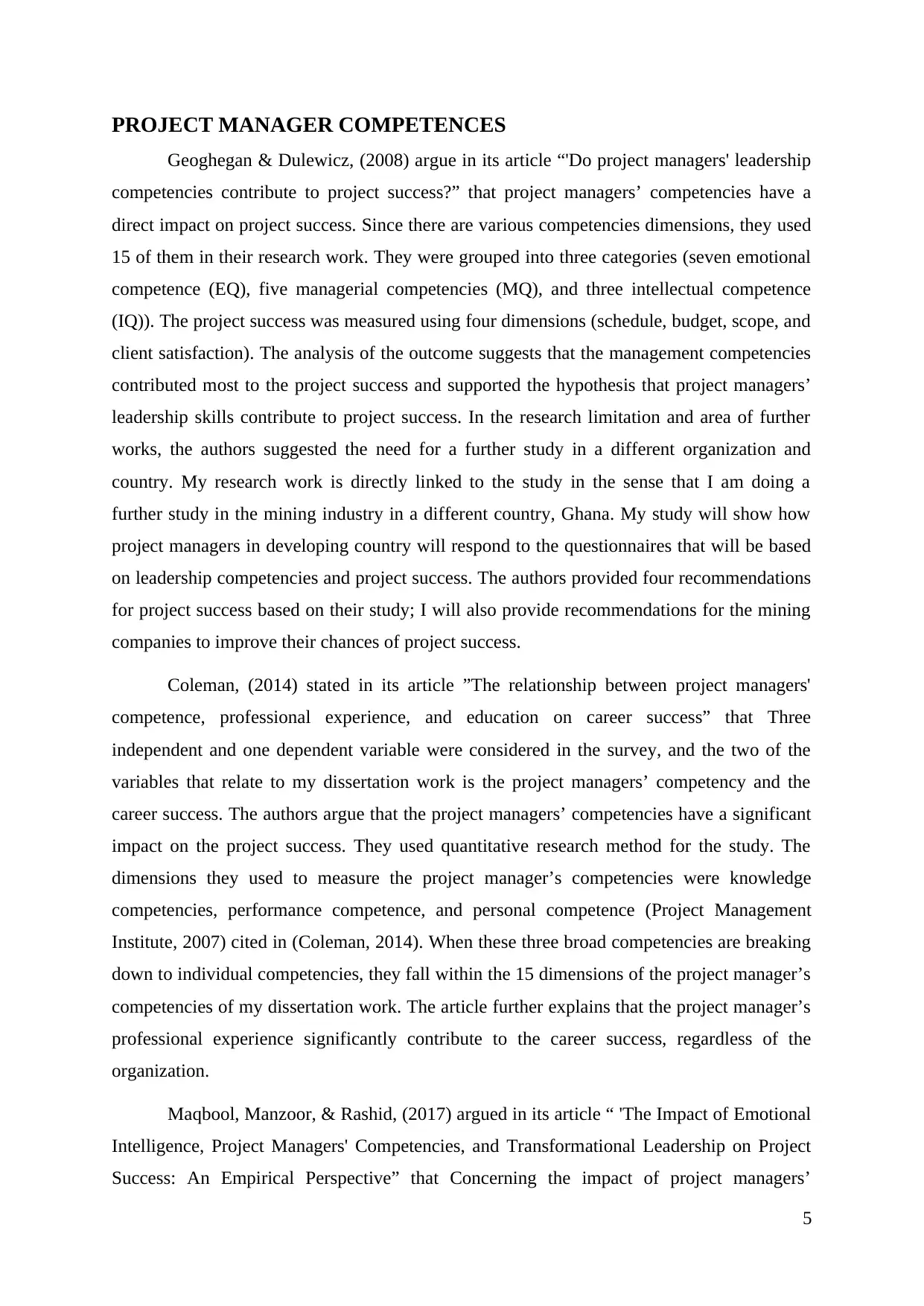
PROJECT MANAGER COMPETENCES
Geoghegan & Dulewicz, (2008) argue in its article “'Do project managers' leadership
competencies contribute to project success?” that project managers’ competencies have a
direct impact on project success. Since there are various competencies dimensions, they used
15 of them in their research work. They were grouped into three categories (seven emotional
competence (EQ), five managerial competencies (MQ), and three intellectual competence
(IQ)). The project success was measured using four dimensions (schedule, budget, scope, and
client satisfaction). The analysis of the outcome suggests that the management competencies
contributed most to the project success and supported the hypothesis that project managers’
leadership skills contribute to project success. In the research limitation and area of further
works, the authors suggested the need for a further study in a different organization and
country. My research work is directly linked to the study in the sense that I am doing a
further study in the mining industry in a different country, Ghana. My study will show how
project managers in developing country will respond to the questionnaires that will be based
on leadership competencies and project success. The authors provided four recommendations
for project success based on their study; I will also provide recommendations for the mining
companies to improve their chances of project success.
Coleman, (2014) stated in its article ”The relationship between project managers'
competence, professional experience, and education on career success” that Three
independent and one dependent variable were considered in the survey, and the two of the
variables that relate to my dissertation work is the project managers’ competency and the
career success. The authors argue that the project managers’ competencies have a significant
impact on the project success. They used quantitative research method for the study. The
dimensions they used to measure the project manager’s competencies were knowledge
competencies, performance competence, and personal competence (Project Management
Institute, 2007) cited in (Coleman, 2014). When these three broad competencies are breaking
down to individual competencies, they fall within the 15 dimensions of the project manager’s
competencies of my dissertation work. The article further explains that the project manager’s
professional experience significantly contribute to the career success, regardless of the
organization.
Maqbool, Manzoor, & Rashid, (2017) argued in its article “ 'The Impact of Emotional
Intelligence, Project Managers' Competencies, and Transformational Leadership on Project
Success: An Empirical Perspective” that Concerning the impact of project managers’
5
Geoghegan & Dulewicz, (2008) argue in its article “'Do project managers' leadership
competencies contribute to project success?” that project managers’ competencies have a
direct impact on project success. Since there are various competencies dimensions, they used
15 of them in their research work. They were grouped into three categories (seven emotional
competence (EQ), five managerial competencies (MQ), and three intellectual competence
(IQ)). The project success was measured using four dimensions (schedule, budget, scope, and
client satisfaction). The analysis of the outcome suggests that the management competencies
contributed most to the project success and supported the hypothesis that project managers’
leadership skills contribute to project success. In the research limitation and area of further
works, the authors suggested the need for a further study in a different organization and
country. My research work is directly linked to the study in the sense that I am doing a
further study in the mining industry in a different country, Ghana. My study will show how
project managers in developing country will respond to the questionnaires that will be based
on leadership competencies and project success. The authors provided four recommendations
for project success based on their study; I will also provide recommendations for the mining
companies to improve their chances of project success.
Coleman, (2014) stated in its article ”The relationship between project managers'
competence, professional experience, and education on career success” that Three
independent and one dependent variable were considered in the survey, and the two of the
variables that relate to my dissertation work is the project managers’ competency and the
career success. The authors argue that the project managers’ competencies have a significant
impact on the project success. They used quantitative research method for the study. The
dimensions they used to measure the project manager’s competencies were knowledge
competencies, performance competence, and personal competence (Project Management
Institute, 2007) cited in (Coleman, 2014). When these three broad competencies are breaking
down to individual competencies, they fall within the 15 dimensions of the project manager’s
competencies of my dissertation work. The article further explains that the project manager’s
professional experience significantly contribute to the career success, regardless of the
organization.
Maqbool, Manzoor, & Rashid, (2017) argued in its article “ 'The Impact of Emotional
Intelligence, Project Managers' Competencies, and Transformational Leadership on Project
Success: An Empirical Perspective” that Concerning the impact of project managers’
5
Paraphrase This Document
Need a fresh take? Get an instant paraphrase of this document with our AI Paraphraser
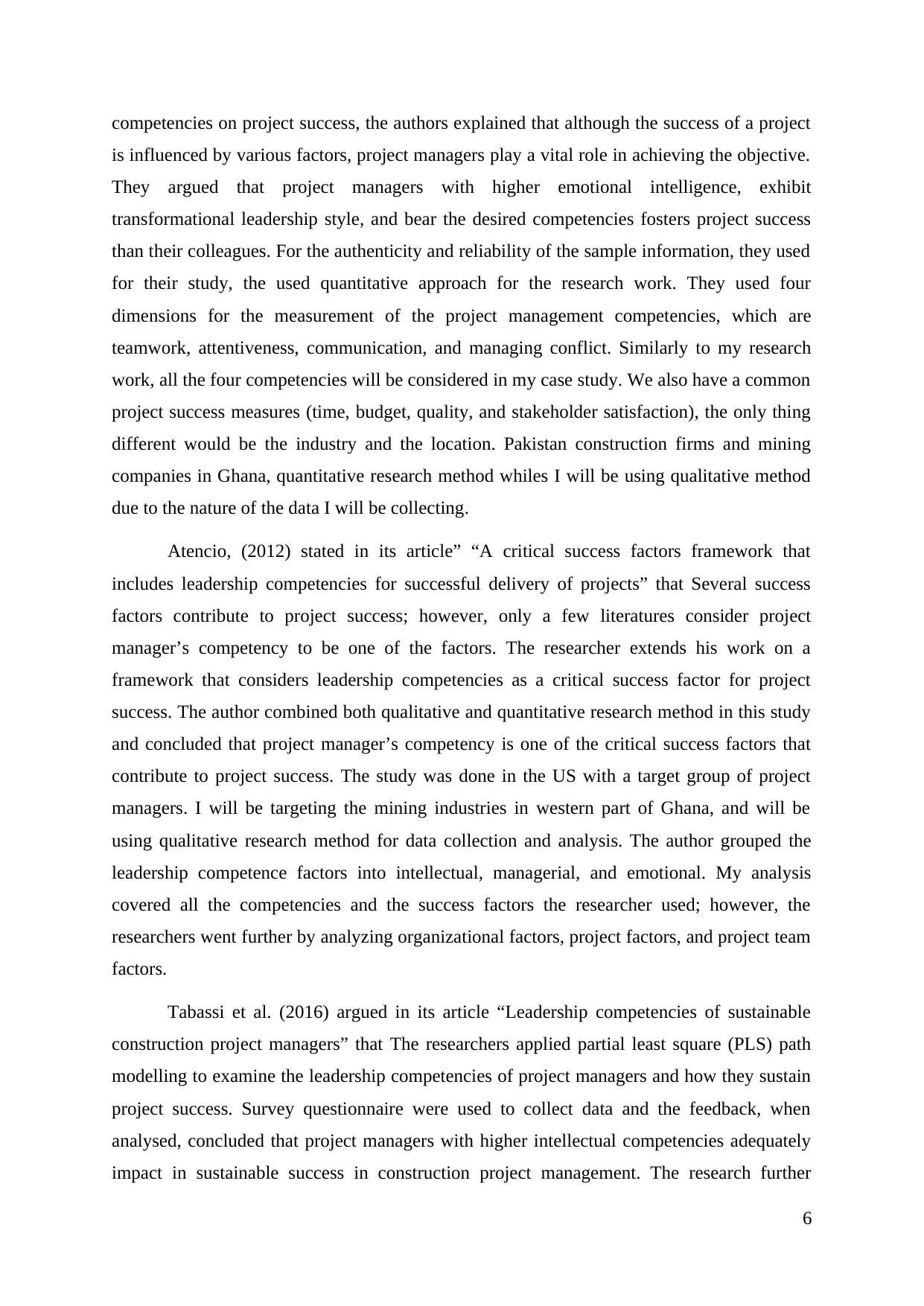
competencies on project success, the authors explained that although the success of a project
is influenced by various factors, project managers play a vital role in achieving the objective.
They argued that project managers with higher emotional intelligence, exhibit
transformational leadership style, and bear the desired competencies fosters project success
than their colleagues. For the authenticity and reliability of the sample information, they used
for their study, the used quantitative approach for the research work. They used four
dimensions for the measurement of the project management competencies, which are
teamwork, attentiveness, communication, and managing conflict. Similarly to my research
work, all the four competencies will be considered in my case study. We also have a common
project success measures (time, budget, quality, and stakeholder satisfaction), the only thing
different would be the industry and the location. Pakistan construction firms and mining
companies in Ghana, quantitative research method whiles I will be using qualitative method
due to the nature of the data I will be collecting.
Atencio, (2012) stated in its article” “A critical success factors framework that
includes leadership competencies for successful delivery of projects” that Several success
factors contribute to project success; however, only a few literatures consider project
manager’s competency to be one of the factors. The researcher extends his work on a
framework that considers leadership competencies as a critical success factor for project
success. The author combined both qualitative and quantitative research method in this study
and concluded that project manager’s competency is one of the critical success factors that
contribute to project success. The study was done in the US with a target group of project
managers. I will be targeting the mining industries in western part of Ghana, and will be
using qualitative research method for data collection and analysis. The author grouped the
leadership competence factors into intellectual, managerial, and emotional. My analysis
covered all the competencies and the success factors the researcher used; however, the
researchers went further by analyzing organizational factors, project factors, and project team
factors.
Tabassi et al. (2016) argued in its article “Leadership competencies of sustainable
construction project managers” that The researchers applied partial least square (PLS) path
modelling to examine the leadership competencies of project managers and how they sustain
project success. Survey questionnaire were used to collect data and the feedback, when
analysed, concluded that project managers with higher intellectual competencies adequately
impact in sustainable success in construction project management. The research further
6
is influenced by various factors, project managers play a vital role in achieving the objective.
They argued that project managers with higher emotional intelligence, exhibit
transformational leadership style, and bear the desired competencies fosters project success
than their colleagues. For the authenticity and reliability of the sample information, they used
for their study, the used quantitative approach for the research work. They used four
dimensions for the measurement of the project management competencies, which are
teamwork, attentiveness, communication, and managing conflict. Similarly to my research
work, all the four competencies will be considered in my case study. We also have a common
project success measures (time, budget, quality, and stakeholder satisfaction), the only thing
different would be the industry and the location. Pakistan construction firms and mining
companies in Ghana, quantitative research method whiles I will be using qualitative method
due to the nature of the data I will be collecting.
Atencio, (2012) stated in its article” “A critical success factors framework that
includes leadership competencies for successful delivery of projects” that Several success
factors contribute to project success; however, only a few literatures consider project
manager’s competency to be one of the factors. The researcher extends his work on a
framework that considers leadership competencies as a critical success factor for project
success. The author combined both qualitative and quantitative research method in this study
and concluded that project manager’s competency is one of the critical success factors that
contribute to project success. The study was done in the US with a target group of project
managers. I will be targeting the mining industries in western part of Ghana, and will be
using qualitative research method for data collection and analysis. The author grouped the
leadership competence factors into intellectual, managerial, and emotional. My analysis
covered all the competencies and the success factors the researcher used; however, the
researchers went further by analyzing organizational factors, project factors, and project team
factors.
Tabassi et al. (2016) argued in its article “Leadership competencies of sustainable
construction project managers” that The researchers applied partial least square (PLS) path
modelling to examine the leadership competencies of project managers and how they sustain
project success. Survey questionnaire were used to collect data and the feedback, when
analysed, concluded that project managers with higher intellectual competencies adequately
impact in sustainable success in construction project management. The research further
6
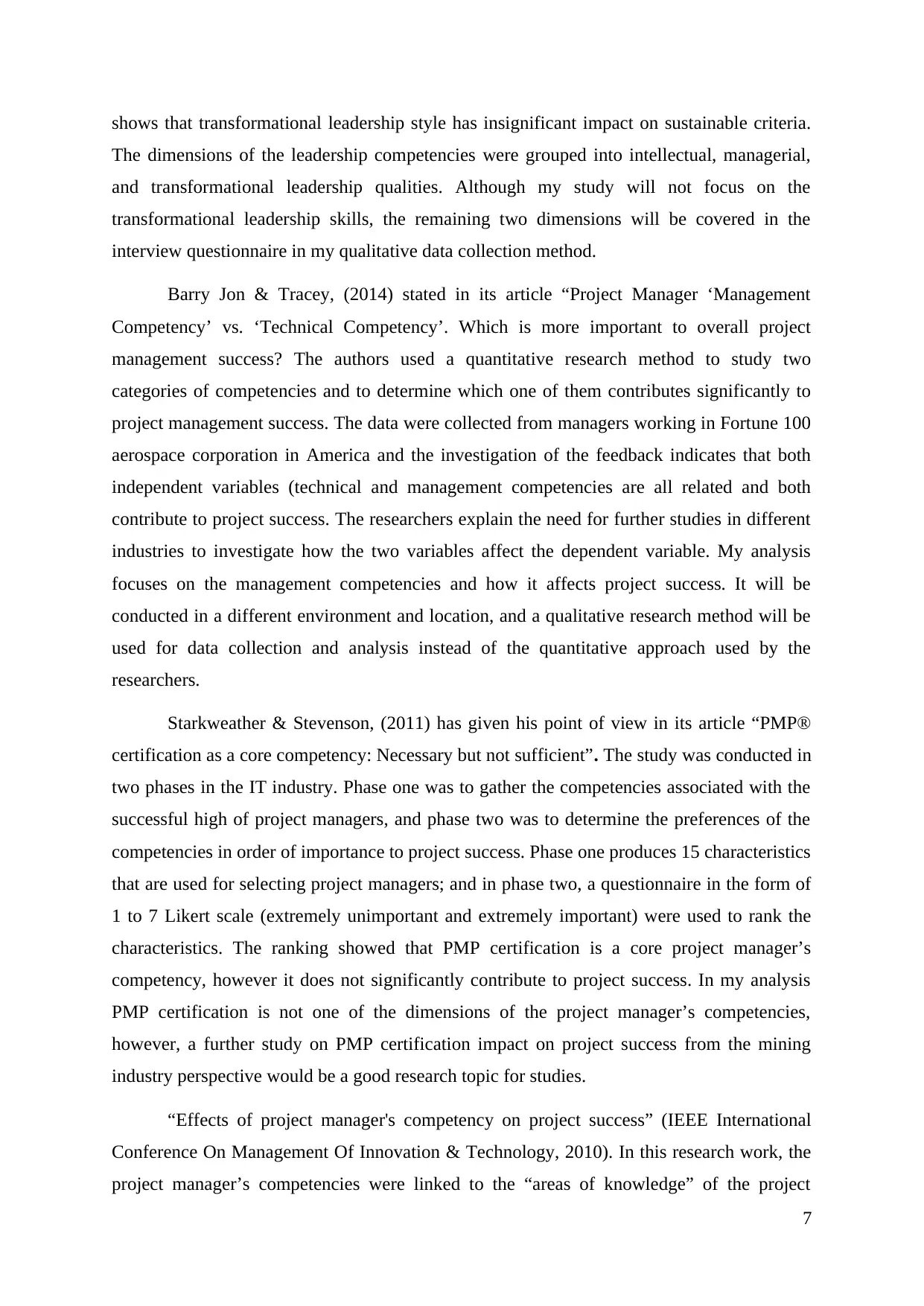
shows that transformational leadership style has insignificant impact on sustainable criteria.
The dimensions of the leadership competencies were grouped into intellectual, managerial,
and transformational leadership qualities. Although my study will not focus on the
transformational leadership skills, the remaining two dimensions will be covered in the
interview questionnaire in my qualitative data collection method.
Barry Jon & Tracey, (2014) stated in its article “Project Manager ‘Management
Competency’ vs. ‘Technical Competency’. Which is more important to overall project
management success? The authors used a quantitative research method to study two
categories of competencies and to determine which one of them contributes significantly to
project management success. The data were collected from managers working in Fortune 100
aerospace corporation in America and the investigation of the feedback indicates that both
independent variables (technical and management competencies are all related and both
contribute to project success. The researchers explain the need for further studies in different
industries to investigate how the two variables affect the dependent variable. My analysis
focuses on the management competencies and how it affects project success. It will be
conducted in a different environment and location, and a qualitative research method will be
used for data collection and analysis instead of the quantitative approach used by the
researchers.
Starkweather & Stevenson, (2011) has given his point of view in its article “PMP®
certification as a core competency: Necessary but not sufficient”. The study was conducted in
two phases in the IT industry. Phase one was to gather the competencies associated with the
successful high of project managers, and phase two was to determine the preferences of the
competencies in order of importance to project success. Phase one produces 15 characteristics
that are used for selecting project managers; and in phase two, a questionnaire in the form of
1 to 7 Likert scale (extremely unimportant and extremely important) were used to rank the
characteristics. The ranking showed that PMP certification is a core project manager’s
competency, however it does not significantly contribute to project success. In my analysis
PMP certification is not one of the dimensions of the project manager’s competencies,
however, a further study on PMP certification impact on project success from the mining
industry perspective would be a good research topic for studies.
“Effects of project manager's competency on project success” (IEEE International
Conference On Management Of Innovation & Technology, 2010). In this research work, the
project manager’s competencies were linked to the “areas of knowledge” of the project
7
The dimensions of the leadership competencies were grouped into intellectual, managerial,
and transformational leadership qualities. Although my study will not focus on the
transformational leadership skills, the remaining two dimensions will be covered in the
interview questionnaire in my qualitative data collection method.
Barry Jon & Tracey, (2014) stated in its article “Project Manager ‘Management
Competency’ vs. ‘Technical Competency’. Which is more important to overall project
management success? The authors used a quantitative research method to study two
categories of competencies and to determine which one of them contributes significantly to
project management success. The data were collected from managers working in Fortune 100
aerospace corporation in America and the investigation of the feedback indicates that both
independent variables (technical and management competencies are all related and both
contribute to project success. The researchers explain the need for further studies in different
industries to investigate how the two variables affect the dependent variable. My analysis
focuses on the management competencies and how it affects project success. It will be
conducted in a different environment and location, and a qualitative research method will be
used for data collection and analysis instead of the quantitative approach used by the
researchers.
Starkweather & Stevenson, (2011) has given his point of view in its article “PMP®
certification as a core competency: Necessary but not sufficient”. The study was conducted in
two phases in the IT industry. Phase one was to gather the competencies associated with the
successful high of project managers, and phase two was to determine the preferences of the
competencies in order of importance to project success. Phase one produces 15 characteristics
that are used for selecting project managers; and in phase two, a questionnaire in the form of
1 to 7 Likert scale (extremely unimportant and extremely important) were used to rank the
characteristics. The ranking showed that PMP certification is a core project manager’s
competency, however it does not significantly contribute to project success. In my analysis
PMP certification is not one of the dimensions of the project manager’s competencies,
however, a further study on PMP certification impact on project success from the mining
industry perspective would be a good research topic for studies.
“Effects of project manager's competency on project success” (IEEE International
Conference On Management Of Innovation & Technology, 2010). In this research work, the
project manager’s competencies were linked to the “areas of knowledge” of the project
7
⊘ This is a preview!⊘
Do you want full access?
Subscribe today to unlock all pages.

Trusted by 1+ million students worldwide
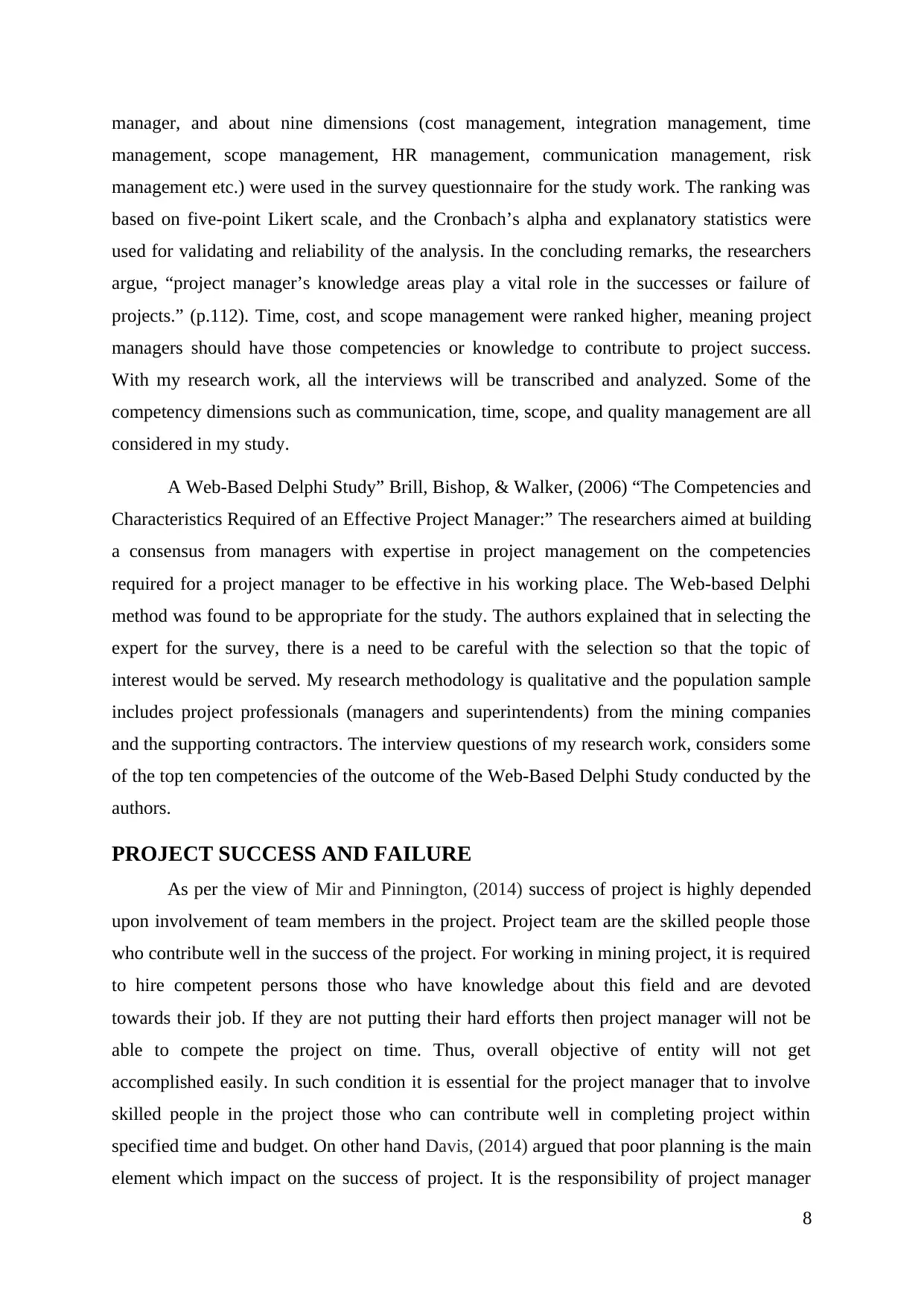
manager, and about nine dimensions (cost management, integration management, time
management, scope management, HR management, communication management, risk
management etc.) were used in the survey questionnaire for the study work. The ranking was
based on five-point Likert scale, and the Cronbach’s alpha and explanatory statistics were
used for validating and reliability of the analysis. In the concluding remarks, the researchers
argue, “project manager’s knowledge areas play a vital role in the successes or failure of
projects.” (p.112). Time, cost, and scope management were ranked higher, meaning project
managers should have those competencies or knowledge to contribute to project success.
With my research work, all the interviews will be transcribed and analyzed. Some of the
competency dimensions such as communication, time, scope, and quality management are all
considered in my study.
A Web-Based Delphi Study” Brill, Bishop, & Walker, (2006) “The Competencies and
Characteristics Required of an Effective Project Manager:” The researchers aimed at building
a consensus from managers with expertise in project management on the competencies
required for a project manager to be effective in his working place. The Web-based Delphi
method was found to be appropriate for the study. The authors explained that in selecting the
expert for the survey, there is a need to be careful with the selection so that the topic of
interest would be served. My research methodology is qualitative and the population sample
includes project professionals (managers and superintendents) from the mining companies
and the supporting contractors. The interview questions of my research work, considers some
of the top ten competencies of the outcome of the Web-Based Delphi Study conducted by the
authors.
PROJECT SUCCESS AND FAILURE
As per the view of Mir and Pinnington, (2014) success of project is highly depended
upon involvement of team members in the project. Project team are the skilled people those
who contribute well in the success of the project. For working in mining project, it is required
to hire competent persons those who have knowledge about this field and are devoted
towards their job. If they are not putting their hard efforts then project manager will not be
able to compete the project on time. Thus, overall objective of entity will not get
accomplished easily. In such condition it is essential for the project manager that to involve
skilled people in the project those who can contribute well in completing project within
specified time and budget. On other hand Davis, (2014) argued that poor planning is the main
element which impact on the success of project. It is the responsibility of project manager
8
management, scope management, HR management, communication management, risk
management etc.) were used in the survey questionnaire for the study work. The ranking was
based on five-point Likert scale, and the Cronbach’s alpha and explanatory statistics were
used for validating and reliability of the analysis. In the concluding remarks, the researchers
argue, “project manager’s knowledge areas play a vital role in the successes or failure of
projects.” (p.112). Time, cost, and scope management were ranked higher, meaning project
managers should have those competencies or knowledge to contribute to project success.
With my research work, all the interviews will be transcribed and analyzed. Some of the
competency dimensions such as communication, time, scope, and quality management are all
considered in my study.
A Web-Based Delphi Study” Brill, Bishop, & Walker, (2006) “The Competencies and
Characteristics Required of an Effective Project Manager:” The researchers aimed at building
a consensus from managers with expertise in project management on the competencies
required for a project manager to be effective in his working place. The Web-based Delphi
method was found to be appropriate for the study. The authors explained that in selecting the
expert for the survey, there is a need to be careful with the selection so that the topic of
interest would be served. My research methodology is qualitative and the population sample
includes project professionals (managers and superintendents) from the mining companies
and the supporting contractors. The interview questions of my research work, considers some
of the top ten competencies of the outcome of the Web-Based Delphi Study conducted by the
authors.
PROJECT SUCCESS AND FAILURE
As per the view of Mir and Pinnington, (2014) success of project is highly depended
upon involvement of team members in the project. Project team are the skilled people those
who contribute well in the success of the project. For working in mining project, it is required
to hire competent persons those who have knowledge about this field and are devoted
towards their job. If they are not putting their hard efforts then project manager will not be
able to compete the project on time. Thus, overall objective of entity will not get
accomplished easily. In such condition it is essential for the project manager that to involve
skilled people in the project those who can contribute well in completing project within
specified time and budget. On other hand Davis, (2014) argued that poor planning is the main
element which impact on the success of project. It is the responsibility of project manager
8
Paraphrase This Document
Need a fresh take? Get an instant paraphrase of this document with our AI Paraphraser
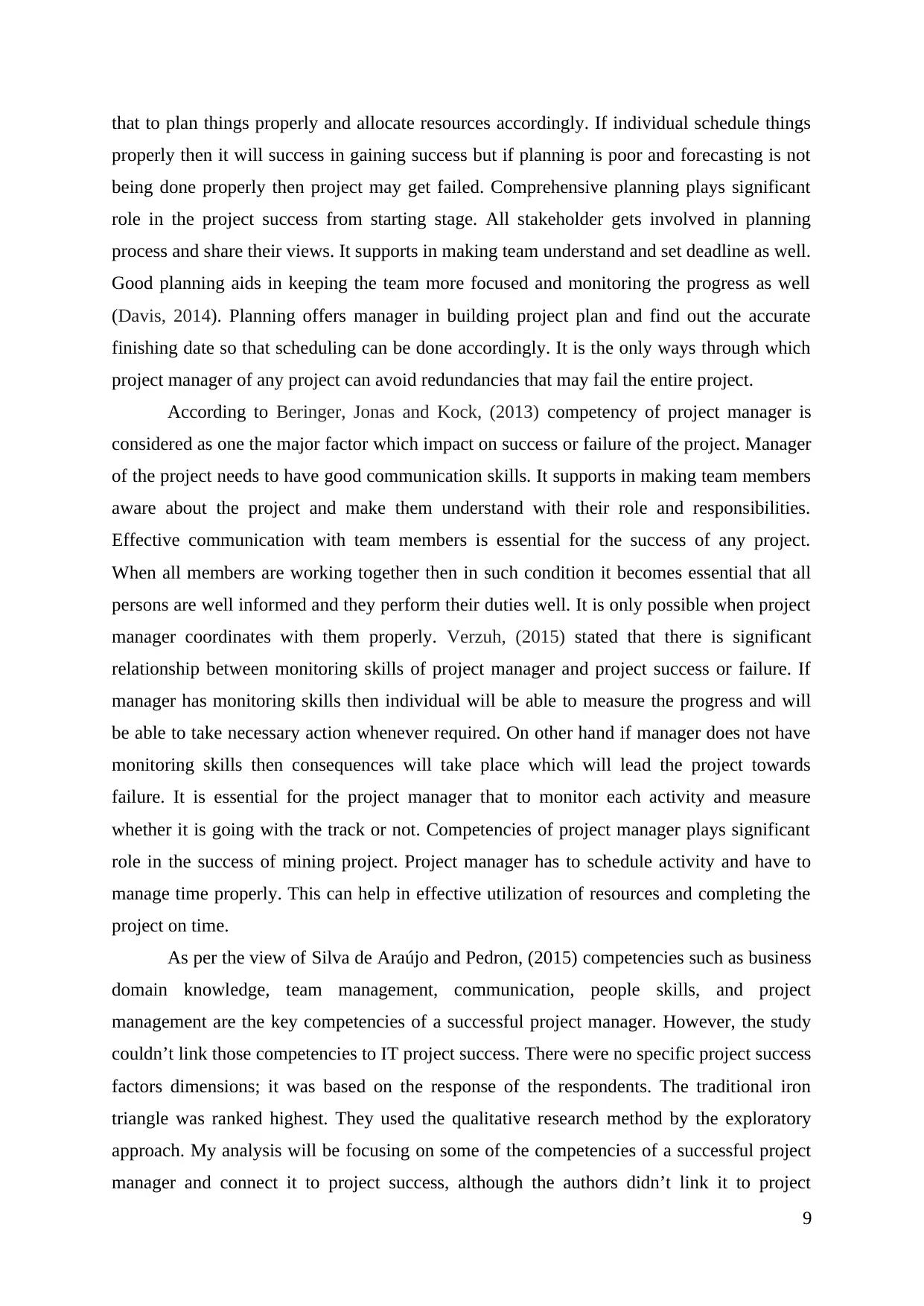
that to plan things properly and allocate resources accordingly. If individual schedule things
properly then it will success in gaining success but if planning is poor and forecasting is not
being done properly then project may get failed. Comprehensive planning plays significant
role in the project success from starting stage. All stakeholder gets involved in planning
process and share their views. It supports in making team understand and set deadline as well.
Good planning aids in keeping the team more focused and monitoring the progress as well
(Davis, 2014). Planning offers manager in building project plan and find out the accurate
finishing date so that scheduling can be done accordingly. It is the only ways through which
project manager of any project can avoid redundancies that may fail the entire project.
According to Beringer, Jonas and Kock, (2013) competency of project manager is
considered as one the major factor which impact on success or failure of the project. Manager
of the project needs to have good communication skills. It supports in making team members
aware about the project and make them understand with their role and responsibilities.
Effective communication with team members is essential for the success of any project.
When all members are working together then in such condition it becomes essential that all
persons are well informed and they perform their duties well. It is only possible when project
manager coordinates with them properly. Verzuh, (2015) stated that there is significant
relationship between monitoring skills of project manager and project success or failure. If
manager has monitoring skills then individual will be able to measure the progress and will
be able to take necessary action whenever required. On other hand if manager does not have
monitoring skills then consequences will take place which will lead the project towards
failure. It is essential for the project manager that to monitor each activity and measure
whether it is going with the track or not. Competencies of project manager plays significant
role in the success of mining project. Project manager has to schedule activity and have to
manage time properly. This can help in effective utilization of resources and completing the
project on time.
As per the view of Silva de Araújo and Pedron, (2015) competencies such as business
domain knowledge, team management, communication, people skills, and project
management are the key competencies of a successful project manager. However, the study
couldn’t link those competencies to IT project success. There were no specific project success
factors dimensions; it was based on the response of the respondents. The traditional iron
triangle was ranked highest. They used the qualitative research method by the exploratory
approach. My analysis will be focusing on some of the competencies of a successful project
manager and connect it to project success, although the authors didn’t link it to project
9
properly then it will success in gaining success but if planning is poor and forecasting is not
being done properly then project may get failed. Comprehensive planning plays significant
role in the project success from starting stage. All stakeholder gets involved in planning
process and share their views. It supports in making team understand and set deadline as well.
Good planning aids in keeping the team more focused and monitoring the progress as well
(Davis, 2014). Planning offers manager in building project plan and find out the accurate
finishing date so that scheduling can be done accordingly. It is the only ways through which
project manager of any project can avoid redundancies that may fail the entire project.
According to Beringer, Jonas and Kock, (2013) competency of project manager is
considered as one the major factor which impact on success or failure of the project. Manager
of the project needs to have good communication skills. It supports in making team members
aware about the project and make them understand with their role and responsibilities.
Effective communication with team members is essential for the success of any project.
When all members are working together then in such condition it becomes essential that all
persons are well informed and they perform their duties well. It is only possible when project
manager coordinates with them properly. Verzuh, (2015) stated that there is significant
relationship between monitoring skills of project manager and project success or failure. If
manager has monitoring skills then individual will be able to measure the progress and will
be able to take necessary action whenever required. On other hand if manager does not have
monitoring skills then consequences will take place which will lead the project towards
failure. It is essential for the project manager that to monitor each activity and measure
whether it is going with the track or not. Competencies of project manager plays significant
role in the success of mining project. Project manager has to schedule activity and have to
manage time properly. This can help in effective utilization of resources and completing the
project on time.
As per the view of Silva de Araújo and Pedron, (2015) competencies such as business
domain knowledge, team management, communication, people skills, and project
management are the key competencies of a successful project manager. However, the study
couldn’t link those competencies to IT project success. There were no specific project success
factors dimensions; it was based on the response of the respondents. The traditional iron
triangle was ranked highest. They used the qualitative research method by the exploratory
approach. My analysis will be focusing on some of the competencies of a successful project
manager and connect it to project success, although the authors didn’t link it to project
9
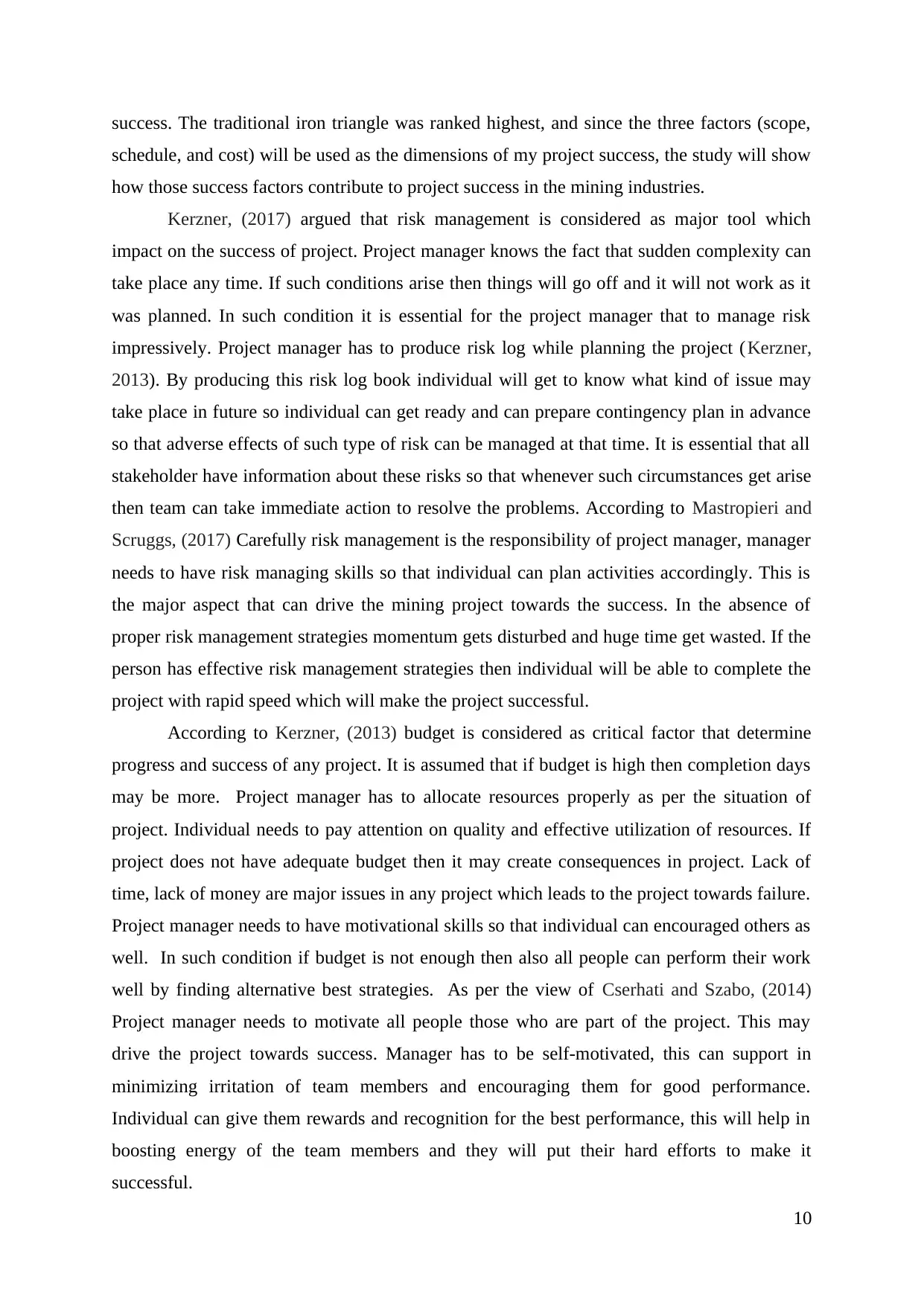
success. The traditional iron triangle was ranked highest, and since the three factors (scope,
schedule, and cost) will be used as the dimensions of my project success, the study will show
how those success factors contribute to project success in the mining industries.
Kerzner, (2017) argued that risk management is considered as major tool which
impact on the success of project. Project manager knows the fact that sudden complexity can
take place any time. If such conditions arise then things will go off and it will not work as it
was planned. In such condition it is essential for the project manager that to manage risk
impressively. Project manager has to produce risk log while planning the project (Kerzner,
2013). By producing this risk log book individual will get to know what kind of issue may
take place in future so individual can get ready and can prepare contingency plan in advance
so that adverse effects of such type of risk can be managed at that time. It is essential that all
stakeholder have information about these risks so that whenever such circumstances get arise
then team can take immediate action to resolve the problems. According to Mastropieri and
Scruggs, (2017) Carefully risk management is the responsibility of project manager, manager
needs to have risk managing skills so that individual can plan activities accordingly. This is
the major aspect that can drive the mining project towards the success. In the absence of
proper risk management strategies momentum gets disturbed and huge time get wasted. If the
person has effective risk management strategies then individual will be able to complete the
project with rapid speed which will make the project successful.
According to Kerzner, (2013) budget is considered as critical factor that determine
progress and success of any project. It is assumed that if budget is high then completion days
may be more. Project manager has to allocate resources properly as per the situation of
project. Individual needs to pay attention on quality and effective utilization of resources. If
project does not have adequate budget then it may create consequences in project. Lack of
time, lack of money are major issues in any project which leads to the project towards failure.
Project manager needs to have motivational skills so that individual can encouraged others as
well. In such condition if budget is not enough then also all people can perform their work
well by finding alternative best strategies. As per the view of Cserhati and Szabo, (2014)
Project manager needs to motivate all people those who are part of the project. This may
drive the project towards success. Manager has to be self-motivated, this can support in
minimizing irritation of team members and encouraging them for good performance.
Individual can give them rewards and recognition for the best performance, this will help in
boosting energy of the team members and they will put their hard efforts to make it
successful.
10
schedule, and cost) will be used as the dimensions of my project success, the study will show
how those success factors contribute to project success in the mining industries.
Kerzner, (2017) argued that risk management is considered as major tool which
impact on the success of project. Project manager knows the fact that sudden complexity can
take place any time. If such conditions arise then things will go off and it will not work as it
was planned. In such condition it is essential for the project manager that to manage risk
impressively. Project manager has to produce risk log while planning the project (Kerzner,
2013). By producing this risk log book individual will get to know what kind of issue may
take place in future so individual can get ready and can prepare contingency plan in advance
so that adverse effects of such type of risk can be managed at that time. It is essential that all
stakeholder have information about these risks so that whenever such circumstances get arise
then team can take immediate action to resolve the problems. According to Mastropieri and
Scruggs, (2017) Carefully risk management is the responsibility of project manager, manager
needs to have risk managing skills so that individual can plan activities accordingly. This is
the major aspect that can drive the mining project towards the success. In the absence of
proper risk management strategies momentum gets disturbed and huge time get wasted. If the
person has effective risk management strategies then individual will be able to complete the
project with rapid speed which will make the project successful.
According to Kerzner, (2013) budget is considered as critical factor that determine
progress and success of any project. It is assumed that if budget is high then completion days
may be more. Project manager has to allocate resources properly as per the situation of
project. Individual needs to pay attention on quality and effective utilization of resources. If
project does not have adequate budget then it may create consequences in project. Lack of
time, lack of money are major issues in any project which leads to the project towards failure.
Project manager needs to have motivational skills so that individual can encouraged others as
well. In such condition if budget is not enough then also all people can perform their work
well by finding alternative best strategies. As per the view of Cserhati and Szabo, (2014)
Project manager needs to motivate all people those who are part of the project. This may
drive the project towards success. Manager has to be self-motivated, this can support in
minimizing irritation of team members and encouraging them for good performance.
Individual can give them rewards and recognition for the best performance, this will help in
boosting energy of the team members and they will put their hard efforts to make it
successful.
10
⊘ This is a preview!⊘
Do you want full access?
Subscribe today to unlock all pages.

Trusted by 1+ million students worldwide
1 out of 16
Related Documents
Your All-in-One AI-Powered Toolkit for Academic Success.
+13062052269
info@desklib.com
Available 24*7 on WhatsApp / Email
![[object Object]](/_next/static/media/star-bottom.7253800d.svg)
Unlock your academic potential
Copyright © 2020–2026 A2Z Services. All Rights Reserved. Developed and managed by ZUCOL.





